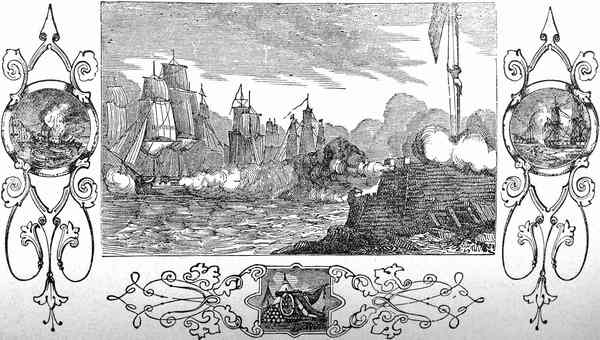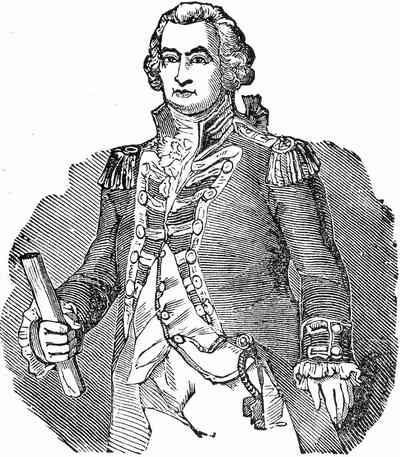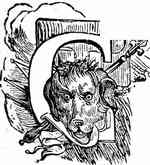Thrilling Incidents In American History
• Preface
Revolutionary War
• Opening Of The Revolution
• The Boston Massacre
• Affair of the Sloop Liberty
• Affair of the Gaspee
• The Tea Riot
• The Boston Port Bill
• The First Continental Congress-Consequent Parliamentary proceedings
• Organization of the Minute-Men
• Patrick Henry-Second Provincial Congress-First Military Enterprise
• Battles of Lexington and Concord
• Battle of Bunker's Hill
• Capture of Ticonderoga
• Second Continental Congress-Washington's Appointment
• Siege of Boston
• Incidents at the Evacuation of Boston
• Burning of Falmouth
• Arnold's Expedition to Quebec
• Siege of Quebec, and Death of Montgomery
• Scenes at Quebec during the Siege
• Expedition against Charleston
• The Declaration of Independence
• The Battle of Long Island
• Washington's Retreat through New Jersey-Capture of General Lee
• Battle of Trenton
• Battle of Princeton
• Capture of General Prescott
• Battle of Brandywine
• Battle of Germantown
• Battle of Red-Bank
• Attack on Fort Mifflin-Retirement of the Army to Valley Forge
• Battle of Bennington
• Murder of Miss M'Crea
• Battle of Stillwater
• Battle of Bemis' Heights, and Retreat of Burgoyne
• Capture of Forts Clinton and Montgomery
• Surrender of Burgoyne
• The Treaty with France
• Attack on Savannah, and Death of Pulaski
• Storming of Stony Point
• General Sullivan's Campaign against the Mohawks
• Tarleton's Quarters
• Battle of Camden, and Death of De Kalb
• Arnold's Treason
• The Loss of the Randolph
• The British Prison-Ships
• Capture of the Serapis
• Putnam's Feat at Horseneck
• Battle of Eutaw Springs
• Wayne's Charge at Green Spring
• Capture of the General Monk
• The Mutinies
• Battle of the Cowpens
• Capture of New London
• Massacre of Wyoming
• Surrender of Cornwallis
War With France
• Capture of L'Insurgente
• The Constellation and Vengeance
War With Tripoli
• Burning of the Philadelphia
• Bombardment of Tripoli
• Loss of the Intrepid
• Expedition of General Eaton
Second War With England
• Battle of Tippecanoe
• Capture of the Guerriere
• Tragical Affair of an Indian Chief
• Battle and Massacre at the River Raisin
• Captain Holmes's Expedition
• Capture of the Caledonia and Detroit
• The Wasp and Frolic
• Gallant Conduct of Lieutenant Allen at the Capture of the Macedonian
• Capture and Destruction of the Java
• Siege of Fort Meigs
• Capture of York, and Death of General Pike
• Defence of Sackett's Harbour
• Defence of Fort Stephenson
• Battle of Lake Erie
• Battle of the Thames
• Gallant Action of Commodore Chauncey under the guns of Kingston Citadel
• The Sacking of Hampton
• Capture of the Peacock
• Massacre at Fort Mimms
• Surrender of Weatherford
• Battle of Niagara
• BattIe of New Orleans
War With Mexico
• Battle of Palo Alto
• Battle of Resaca de la Palma
• Capture of Monterey
• Battle in the Streets of Monterey
• Thrilling Scenes in the Battle of Buena Vista
• Bombardment of Vera Cruz
• Battle of Cerro Gordo
• Battles of Contreras and Churubusco
• Storming of Chapultepec


Attack on Fort Moultrie

Sir Peter Parker.
EXPEDITION AGAINST CHARLESTON.
 HARLESTON, the capital of South CarolIna, stands on a
point of land which lies between the rivers Cooper and Ashley, which fall into a
bay of the
Atlantic; and in the bay there are several islands. The people resolved to
fortify the capital of the province; and for that purpose erected a fort on
Sullivan's Island, which lies in the bay, about six miles below the town, and
near the channel leading to it. The fort was
constructed with the wood of the palmetto, a tree peculiar to the Southern
States,
which grows from twenty to forty feet high without branches, and terminates in a
top resembling the head of a cabbage. The wood of
the tree is remarkably spongy; and a ball entering it makes no extended
fracture, but buries itself in the wood, without injuring the adjacent parts.
The fort was mounted with about thirty cannon-thirty-two, eighteen, and
nine-pounders.
HARLESTON, the capital of South CarolIna, stands on a
point of land which lies between the rivers Cooper and Ashley, which fall into a
bay of the
Atlantic; and in the bay there are several islands. The people resolved to
fortify the capital of the province; and for that purpose erected a fort on
Sullivan's Island, which lies in the bay, about six miles below the town, and
near the channel leading to it. The fort was
constructed with the wood of the palmetto, a tree peculiar to the Southern
States,
which grows from twenty to forty feet high without branches, and terminates in a
top resembling the head of a cabbage. The wood of
the tree is remarkably spongy; and a ball entering it makes no extended
fracture, but buries itself in the wood, without injuring the adjacent parts.
The fort was mounted with about thirty cannon-thirty-two, eighteen, and
nine-pounders.
In the latter part of the year 1775 and beginning of 1776, great exertions had been made in Britain to send an overwhelming force, into America; and on the 2d of June the alarm-guns were fired in the vicinity of Charleston, and expresses sent to the militia officers to hasten to the defence of the capital with the forces under their command. The order was promptly obeyed; and some continental regiments from the neighbouring states also arrived. The whole was under the direction of General Lee, who had been appointed commander of an the forces in the Southern States, and had under him the continental generals, Armstrong and Howe.
The utmost activity prevailed in Charleston. The citizens, abandoning their usual avocations, employed themselves entirely in putting the town into a respectable state of defence. They pulled down the valuable storehouses on the wharves, barricaded the streets, and constructed lines of defence along the shore. Relinquishing the pursuits of peaceful industry and commercial gain, they engaged in incessant labour, and prepared for bloody conflicts. The troops, amounting to between five and six thousand men, were stationed in the most advantageous positions. The second and third regular regiments of South Carolina, under Colonels Moultrie and Thomson, were posted on Sullivan's Island. A regiment, commanded by Colonel Gadsden, was stationed at Fort Johnson, about three mIles below Charleston, on the most northerly point of James's Island, and within point-blank shot of the channel. The rest of the troops were posted at Haddrel's Point, along the bay near the town, and at such other places as were thought most proper. Amidst an this bustle and preparation, lead for bullets was extremely scarce, and the windows of Charleston were stripped of their weights, in order to procure a small supply of that necessary article.
While the Americans were thus busily employed, the British exerted themselves with activity. About the middle of February, an armament sailed from the cove of Cork, under the command of Sir Peter Parker and Earl Cornwallis, to encourage and support the loyalists in the southern provinces.
After a tedious voyage, the greater part of the fleet reached Cape Fear, in North Carolina, on the 3d of May. General Clinton, who had left Boston in December, took the command of the land forces, and issued a proclamation, promising pardon to all the inhabitants who laid down their arms; but that proclamation produced no effect. Early in June, an armament, consisting of between forty and fifty vessels, appeared off Charleston Bay, and thirty-six of the transports passed the bar, and anchored about three miles from Sullivan's Island. Some hundreds of the troops ]anded on Long Island, which lies on the west of Sullivan's Island, and which is separated from it by a narrow channel, often fordable. On the 10th of the month, the Bristol, a fifty-gun ship, having taken out her guns, got safely over the bar; and on the 25th, the Experiment, a ship of equal force, arrived, and next day passed in the same way. On the part of the British everything was now ready for action. Sir Heary Clinton had nearly three thousand men under his command. The naval force, under Sir Peter Parker, consisted of the Bristol and Experiment, of fifty guns each; the Acteon, Solebay, and Syren frigates, of twenty-eight guns each; the Friendship, of twenty-two, and the Sphinx, of twenty guns; the Ranger s]oop, and Thunder bomb, of eight guns each.
On the forenoon of the 28th of June, this fleet advanced against the fort on Sullvan's Island, which was defended by Colonel Moultrie, with three hundred and forty-four regular troops, and some militia, who volunteered their services on the occasion. The Thunder bomb began the battle. The Acteon, Bristol, Experiment, and Solebay followed boldly to the attack, and a terrible cannonade ensued. The fort returned the fire of the ships slowly, but with deliberate and deadly aim. The contest was carried on during the whole day with unabating fury. All the forces collected at Charleston stood prepared for battle; and both the troops and the numerous spectators beheld the conflict with alternations of hope and fear, which appeared in their countenances and gestures. They knew not how soon the fort might be silenced or passed by, and the attack made immediately upon them selves; but they were resolved to meet the invaders at the water's edge, to dispute every inch of ground, and to prefer death to what they considered to be slavery.
The Sphinx, Acteon, and Syren were ordered to attack the western extremity of the fort, which was in a very unfinished state; but as they proceeded for that purpose, they got entangled with a shoal, caned the Middle Ground. Two of them ran foul of each other; the Acteon stuck fast; the Sphinx and Syren got off, the former with the loss of her bowsprit, the latter with little injury; but, happily for the Americans, that part of the attack completely failed.
It had been concerted that, during the attack by the ships, Sir Henry Clinton, with the troops, should pass the narrow channel which separates Long Island from Sullivan's Island, and assail the fort by land; but this the general found impracticable; for the channel, though commonly fordable, was at that time, by a long prevalence of easterly winds, deeper than usual. Sir Henry Clinton and some other officers waded up to the shoulders; but finding the depth still increasing, they abandoned the intention of attempting the passage. The seamen who found themselves engaged in such a severe conflict, often cast a wistful look towards Long Island, in the hope of seeing Sir Henry Clinton and the troops advancing against the fort; but their hope was disappointed, and the ships and the fort were left to themselves to decide the combat. Although the channel had been fordable, the British troops would have found the passage an arduous enterprise; for Colonel Thommson, with a strong detachment of riflemen, regulars, and militia, was posted on the east end of Sullivan's Island to oppose any attack made in that quarter.
In the course of the day the fire of the fort ceased for a short time, and the British flattered themselves that the guns were abandoned; but the pause was occasioned solely by the want of powder, and when a supply was obtained the cannonade recommenced as steadily as before. The engagement, which began about eleven o'clock in the forenoon, continued with unabated fury till seven in the evening, when the fire slackened, and about nine entirely ceased on both sides. During the night, all the ships except the Acteon, which was aground, removed about two miles from the island. Next morning the fort fired a few shots at the Acteon, and she at first returned them; but, in a short time, her crew set her on fire and abandoned her. A party of AmerIcans boarded the burning vessel, seized her colours, fired some of her guns at Commodore Parker, filled three boats with her sails and stores, and then quitted her. She blew up shortly afterwards.
In this obstinate engagement both parties fought with great gallantry. The loss of the British was considerable. The Bristol had forty men killed, and seventy-one wounded; Mr. Morris, her captain, lost an arm. The Experiment had twenty-three men killed, and, seventy-six wounded; Captain Scott, her commander, also lost an arm; Lord William Campbell, the late governor of the province, who served on board as a volunteer, received a wound in his side, which ultimately proved mortal; Commodore Sir Peter Parker received a slight contusion. The Acteon had Lieutenant Pike killed, and six men wounded. The Solebay had eight men wounded. After some days the troops were all reimbarked, and the whole armament sailed for New York. The garrison lost ten men killed, and twenty-two wounded. Although the Americans were raw troops, yet they behaved with the steady intrepidity of veterans. In the course of the engagement the flag-staff of the fort was shot away; but Sergeant Jasper leaped down upon the beach, snatched up the flag, fastened it to a sponge staff, and, while the ships were incessantly directing their broadsides upon the fort, he mounted the merlon and deliberately replaced the flag. Next day President Rutledge presented him with a sword, as a testimony of respect for his distinguished valour. Colonel Moultrie, and the officers and troops on Sullivan's Island, received the thanks of their country for their bravery; and, in honour of the gallant commander, the fort was named Fort Moultrie.
The failure of the attack on Charleston was of
great importance to the American cause, and contributed much to the
establishment of the popular government. The friends of Congress triumphed; and
numbers of them, ignorant of the power of Britain and of the spirit which
animated her counsels, fondly imagined that their freedom was achieved. The
diffident became bold; the advocates of the irresistibility of British fleets
and armies were mortified and silenced; and they who from interested motives
had hitherto been loud in their professions of
loyalty, began to alter their tone. The brave defence
of Fort Moultrie saved the Southern States from the
horrors of war for several years.